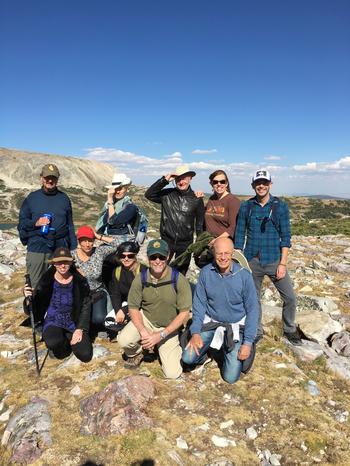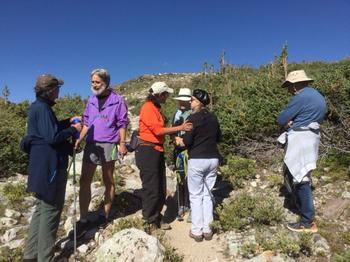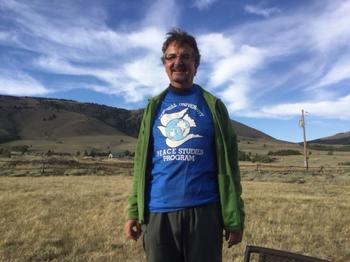Report: “IR 2030,” KFG Workshop at the University of Wyoming, August 26-27, 2016
Nov 30, 2016
From bottom to top: Liesbet Hooghe, Martha Finnemore, Etel Solingen, Matthew Evangelista, Stephen Krasner, Thomas Risse, Kathryn Sikkink, Gary Marks, Stephanie Anderson, Nevin Aiken in the Snowy Range
Image Credit: Privat
Participants hiking in the Snowy Range mountains
Image Credit: privat
Thomas wearing his very special birthday present
Image Credit: privat
In late August, the KFG – together with Jean Garrison and the Center for Global and Areas Studies at the University of Wyoming – hosted a workshop entitled “International Relations 2030” in Laramie, Wyoming, close to Tanja and Thomas’ second home. The workshop had originally been planned for the occasion of the birthdays of Kathryn Sikkink and Thomas who both turned 60 recently.
In late August, the KFG – together with Jean Garrison and the Center for Global and Areas Studies at the University of Wyoming – hosted a workshop entitled “International Relations 2030” in Laramie, Wyoming, close to Tanja and Thomas’ second home. The workshop had originally been planned for the occasion of the birthdays of Kathryn Sikkink and Thomas who both turned 60 recently.
An illustrious group of North American International Relations scholars showed up, among them Mike Barnett (George Washington University), KFG regular Jeff Checkel (Simon Fraser University), Matt Evangelista (Thomas’ old friend from Cornell University), Marty Finnemore (George Washington University), KFG senior fellows Liesbet Hooghe and Gary Marks (University of North Carolina, Chapel Hill), our SFB Mercator fellow Steve Krasner (Stanford University), Kathryn Sikkink (Thomas’ long-term collaborator on human rights research from Harvard University), our comparative regionalism “partner in crime”, Etel Solingen (University of California, Irvine), as well as various faculty members from the University of Wyoming.
The academic part of the workshop discussed “International Relations 2030,” as a “blue sky” collective brainstorming exercise: How would the field of International Relations look like in 2030? What are the likely theoretical and substantive controversies? And what about the real world in 2030? Will we still be discussing the themes of the early 21st century? The debates centered around the accomplishments of norms research in IR, on the need to break the barriers between comparative politics and IR, and on the lack of serious theorizing in contemporary IR. But we also discussed substantive themes, such as the future of nuclear weapons in 2030 or the state of the art in human rights research.
There was also a fun part to the workshop: Participants went on a hike at 3000m/10.000 feet in the Snowy Range mountains (see pictures) where we almost left back Steve Krasner alone in a locked car. Afterwards, workshop participants and Wyoming friends enjoyed a barbeque at T&T’s place in Centennial (where Matt Evangelista had a special present for Thomas, the official Cornell Peace Studies Program T-shirt of the late 1980s!).




